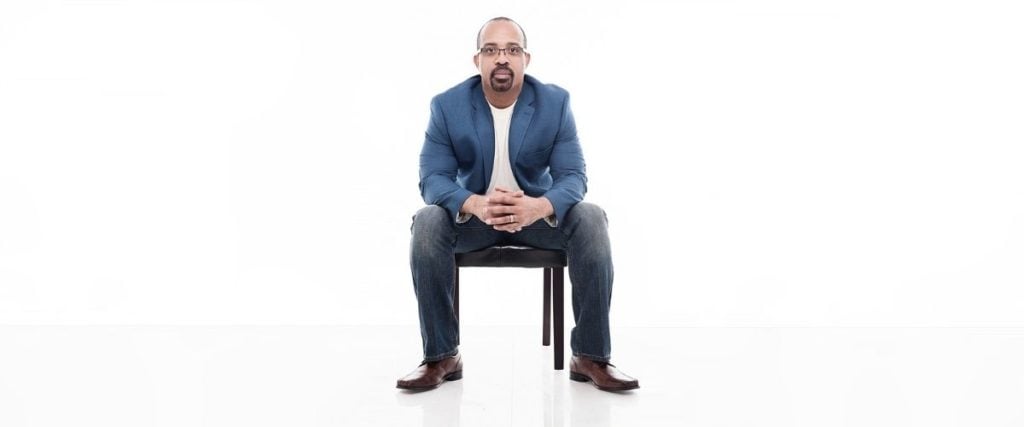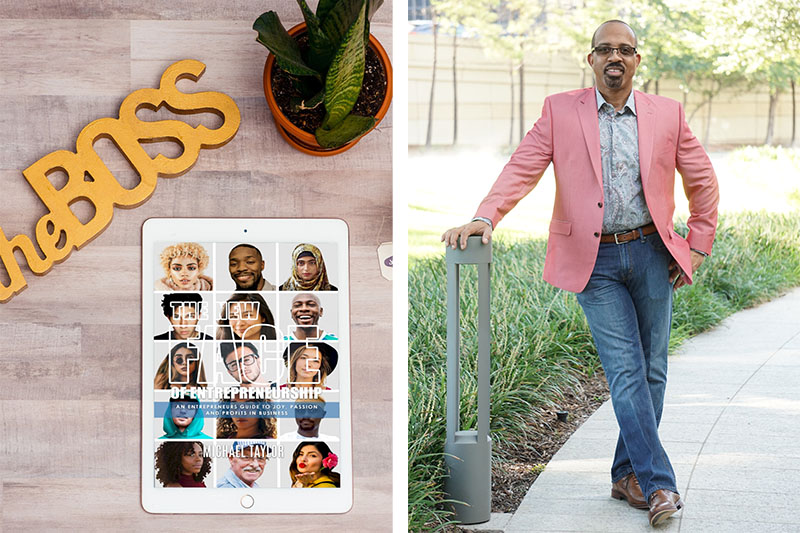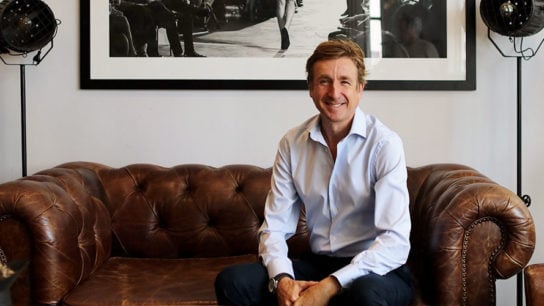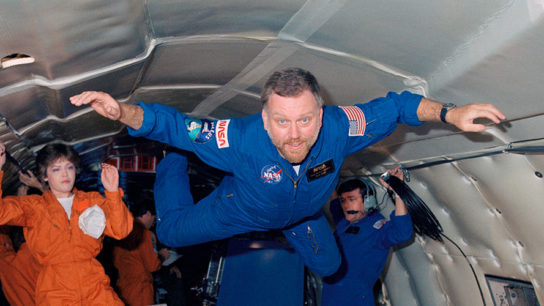From homelessness to happiness, Michael Taylor, an entrepreneur, life coach, and author, talks through finding clarity, overcoming disconnection, and realising self-actualisation.
Michael Taylor is a motivational speaker, author, and entrepreneur. Though, as a Black man in America, the road to success was far from simple.
By the time Michael was 23 years old, he was living the American Dream. He had the house, the wife and kids, and a sense of purpose that made him believe that he was set for life.
But then things took a sharp turn for the worse. What had once been the American Dream quickly turned into the American Nightmare as he underwent everything from divorce and bankruptcy to depression and homelessness. Forced to stop and assess his understanding of happiness, and all other fundamental beliefs that had been ingrained in him since childhood, Michael underwent a radical change in his worldview, refocusing on reconnection, self-awareness, and self-actualisation.
Today, as the author of The Cure For Onlyness: A Black Man’s Guide to Joy, Passion, and Purpose, he has dedicated his life to sharing the lessons he’s learned, through grit and struggle, with other men of colour.
If you’ve ever felt lost, stuck, or out of options, Michael’s harrowing life story will inspire you to create the life you want, rather than waiting for it to reveal itself in all the wrong places.
Here is the story of how Michael shifted his perspective on life, as a Black man in America, and as a person in search of happiness.
What made you want to become an entrepreneur?
When I was 10 years old, I knew that I wanted to be an entrepreneur. I remember a conversation I had with my grandfather in which I said, ‘Grandpa, when I grow up I’m going to be rich.’ He asked me how I was going to do that. And I told him I was going to own my own company. He looked at me, smiled, and said, ‘You know, that’s a really great goal to have. Now, if you’re going to be rich, I’m going to tell you the only two things you need to know if you want to be rich. Number one: You have to learn to think like rich people. The only difference between rich people and poor people is how they think. Number two: If you’re going to be rich, you have to learn how to listen, because rich people will tell you how they got rich. It’s your responsibility to figure out how to apply what they tell you.’ So, it was instilled in me at a very early age that I could be successful if I chose to be. There was just this burning desire in me to be an entrepreneur.
Fast forward to me at 14 years old. I’m walking to school one day and I pass by this motor shop, and there are two guys arguing very, very loudly. One of the guys was a mechanic, the other guy was the owner. The mechanic was upset because the owner wanted him to sweep the floors. His words were: ‘I’m the damn mechanic. I’m not supposed to be sweeping floors.’
Well, I walked in and I said, ‘Sir, I heard your conversation. Sorry for eavesdropping, but I have a solution to your problem. Why don’t you hire me to clean your garage?’ The guy looks at me and smiles. He goes, ‘Really?’ I go, ‘Yeah, I’d be glad to.’ He says, ‘Well, how much are you going to charge me?’ I say, ‘I’ll clean your garage first and then you pay me what you think it’s worth.’
So I cleaned that garage so well you could have had dinner off the floor. It was so clean. The guy was so impressed. He said, ‘I’ll tell you what. I’ll pay you $5 an hour to clean my garage.’ Now, this was in 1974 when minimum wage was $1.60 an hour. I’m 14 years old, I’m making five bucks an hour. And it turns out, he had three other friends that owned garages so I ended up working for those guys, too.
Fast forward a little more, and now I’m 17 years old in high school. This guy at a seminar convinces me that I can get rich selling vacuum cleaners. So I dropped out of high school in 11th grade, hoping to get rich… by selling vacuum cleaners. Now, obviously, that was a very poor choice. But it actually taught me a very valuable lesson: I was willing to take risks. Even though I never sold a vacuum cleaner, I was really proud of myself for being courageous enough to just jump out there.
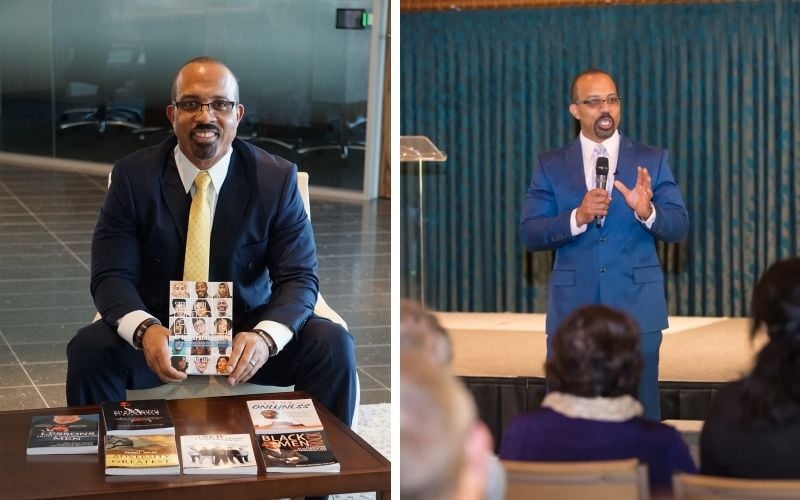
How did you go from dropping out of high school to becoming an entrepreneur, author, and motivational speaker?
I found a job at a building supply center. I’m 19 at this point, and I worked really hard to climb that corporate ladder pretty quickly. At 20 years old, I became the youngest manager in the history of this particular company. At the age of 23, I was living the American dream. I had the house, the wife, the kids. By society’s standards, I was pretty successful. But in about a six-and-a-half-year timeframe, that American Dream turned into the American nightmare. I went through a divorce, bankruptcy, foreclosure, a deep, deep depression, and became homeless for two years. I was living out of my car. And during the darkest period of my life, I received a miracle.
I was sitting up late one night because I was too depressed to sleep. And I’m sitting on the edge of my bed looking across the room at my bookshelf when I happen to notice that every book I owned had something to do with getting rich and making money. Now, when I was 10, my grandfather had told me that I had to learn to listen. Well, I listened and I was reading all those books on getting rich. It was all I focused on. As I was sitting there looking at these books, all of a sudden this question popped into my head, ‘Michael, what if you took all this away, and simply figured out how to be happy?’
There’s no way I can explain what happened. But all of a sudden, my depression lifted. I had this amazing clarity that I was going to be able to rebuild my life. I had no idea how, but there was a part of me that intuitively knew I was going to be able to rebuild my life into something extraordinary. As a result of asking myself that simple question, I stopped reading books on getting rich and making money. I started reading books on psychology, philosophy, spirituality, metaphysics, and personal development. I went on this amazing journey of transformation. I was able to rebuild my life. It took some time and it was difficult, but ultimately, I put all the pieces back together. I found the love of my life. I’ve been blissfully married for the past 18 years. After I came out of that depressive state and started getting back on track, I decided that I wanted to share the lesson that I learned with other men. Because I knew I couldn’t have been the only man to have gone through the stuff that I went through.
What is “Onlyness”?
Jewel Love is a therapist who I’ve done some webinars with, and he runs an organisation in California called “Black Executive Men”, where he deals with some of the wealthiest, most intelligent Black men in the United States. He wrote an article on LinkedIn, and it said that the number one mental health challenge for Black men was “onlyness”. I’d never heard that term before, but when I read it, it deeply resonated with me because onlyness is something I’ve experienced all my life. It’s what I’ve been writing about, and I know what the cure is because I’ve been writing about men’s issues for 20 years.
I define onlyness as a feeling of separation and disconnection from others because of race. So that, to me, is an ominous feeling of separation and disconnection. But when I walk into a room and I’m the only Black guy there, it doesn’t bother me one single bit. Why? Because I come in there knowing who I am, knowing what I have to contribute, and knowing that I have something to say. I’ve had experiences where obviously, people didn’t like me because of the colour of my skin. They knew nothing else about me other than the fact that I’m Black, but again, it boils down to how well I know myself.
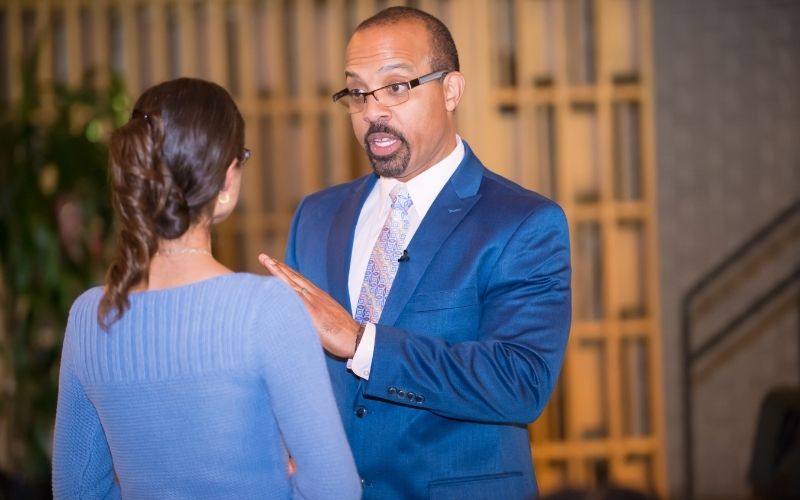
What is the cure for it?
The cure for onlyness is self-awareness and self-actualisation. When you’re dealing with environments in which you’re the only person of colour, it’s challenging. There are microaggressions and the little things that people say at work that you can’t really address. How do we deal with those issues? Well, one of the things that I preach is self-awareness. Here’s the challenge for people of colour. We live in a world that has created these labels, and too many times we accept these labels as facts, right? One of the worst labels that people of colour are attached to is the label called ‘minority’. Think about that for a moment – what exactly is a minority? We can say a minority is simply a group of people that don’t make up the majority, and obviously, white people make up the majority in America so Black people are the minority. The problem is, a minority mindset will keep you trapped in mediocrity. A minority mindset will convince you that you’re less than. We’re constantly bombarded with this.
Yet, I’ve never seen myself as a minority. Even when I was a kid, I used to argue with my grandparents about it. I’m not a minority. I’m a Black guy. Don’t call me a minority. When we understand who we really are, then those labels are no longer attached to them. Now, as a Black guy, I’ve been attacked, ostracised, and vilified, because I say I’m not a minority. Well, what exactly does that mean? If you look at the census data in the next 10 to 15 years, white people are going to be the minority. Will they be labelled minorities then? And will they feel less than because of that label? I don’t know the answer to that but I do know that too many people of colour buy into this label called minority. That’s not who they are. We have to be willing to break those labels.
As a Black man, what experience taught you your most valuable lesson?
In 1983, I became a manager at the building supply centre I mentioned earlier. I was 23 years old. It was in a little city, just south of Houston. There were still active Ku Klux Klan halls 10 miles down the street. I had so many confrontations, direct confrontations, where I’d be talking to people, and they’d call me the n-word to my face.
My employees had never worked for a Black guy, and there was one guy in particular who, from the moment he walked in, I knew we were not going to get along.
Now, as a manager, I was very professional. I didn’t take it personally. I couldn’t have cared less if they didn’t like me. As long as they were doing their jobs, I didn’t have an issue with it. But there’s that vibration people give off when they don’t like you. When I became aware of that feeling, that vibration, I did everything in my power to reassure him that, although I was the manager, I wasn’t trying to take over anything, or bring on Black policies or anything, you know? I wanted him to know that I was there and he was part of the team. But he was trying to sabotage me, to get me fired.
I would sometimes go on deliveries to make sure that everything went well. Well, one day, it just so happened that the customer we were delivering to knew the man I was having trouble with at work. And he says to me, ‘I want you to watch out for that guy because he’s a member of the Ku Klux Klan.’ Now, how did I pick up on that? I didn’t know he was a part of the Klan, but this energy that he gave off told me that there was something wrong. It was a vibration. My point here is that we individually have to learn to trust our own inner wisdom and our own inner voice. We have to be confident enough in ourselves to believe that feeling. Don’t overreact. Pay attention to it and learn to trust it.
That takes awareness. When we get that feeling, we’ve got a couple of choices. We can choose to stay in that bad environment or we can refuse to stay. But if I’m ever in an environment where I know I’m disliked simply because of the colour of my skin, then I’d choose to go somewhere else.
As a man who happens to be Black, I believe I have a responsibility to share the lessons I’ve learned with men who look like me. In the Black community, we’ve always had this stigma attached to things like therapy and emotional work because we’ve relied primarily on religion since we were brought to this country. One of the reasons why I’m so passionate about talking about this stuff is because we have to be willing to change that conversation. It’s not just about religion, it’s about humaneness. It’s about emotional things that have nothing to do with ethnicity or religion. It’s about being human.
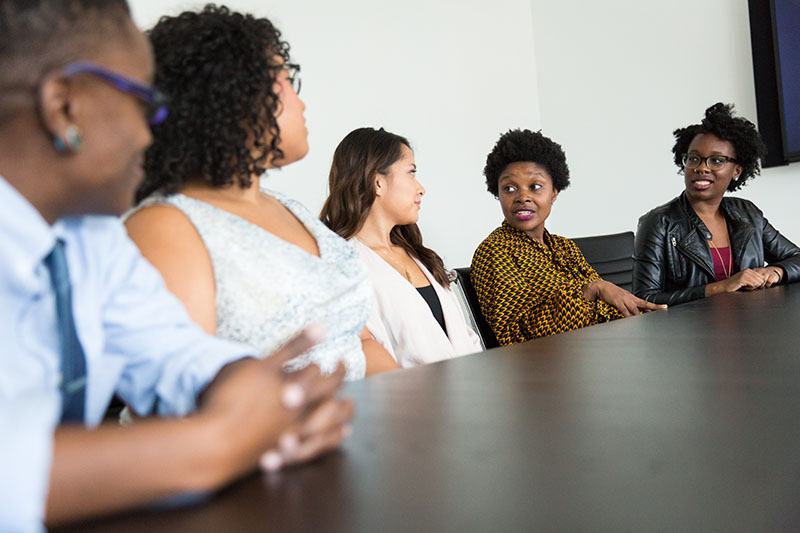
What is the most destructive narrative people of colour face?
The most destructive narrative is this whole idea that we’re an endangered species. When you look at things like what happened with George Floyd and the police brutality, unfortunately, a lot of young, Black men are internalising this idea that they’re expendable, that they don’t matter, that nobody cares about them. They’re terrified. They’re scared. They don’t think they can achieve anything because they still feel that the world is against them, and it’s a destructive way of thinking. They think “I’m not worthy. I’m not good enough. The world is against me. I’ve got to constantly fight against the system.”
What advice do you have to give to those who have experienced, or struggle with, onlyness?
The confidence I have now is because of this 25-year-long self-awareness journey. It has allowed me to authentically connect with who I am as a human being. When I was in my 20s, I read a book by a man named Wayne Dyer. In the book, he said that, as a human being, you have within you the capacity to do anything any other human being has done. And even if it hasn’t been done, you can be the first. Now, in my 20s, I was climbing the corporate ladder, and when I read that statement, my soul, my heart, whatever you want to call it, really got it.
In that moment, I was no longer attached to just being Black. I wasn’t denying my ethnicity, I was affirming my humanity. I’m a human being, so that means I can do anything I set my mind to. His way of thinking challenged me to look beyond just being a young, Black guy in America with only a high-school education. It was his way of thinking that challenged me to think bigger, and to be unlimited in my thinking. Wayne Dyer says, “We are not human beings having a spiritual experience. We are actually spiritual beings having a human experience.”
If you can make that distinction, then you get to the magic, because the spiritual aspect of who you are is what will give you the confidence to be who you are. Then you’re no longer attached to these external labels like ethnicity and minority. The key to overcoming onlyness is self-awareness and self-actualisation because self-actualisation is the process to connecting to your divinity.
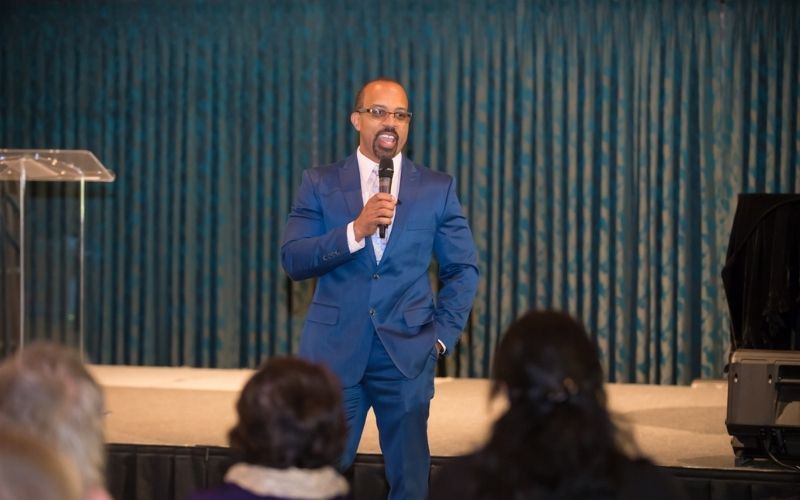
What’s something you wish you’d known earlier in life?
Most of my life, I was driven by a deep sense of shame. Shame can be a paralysing feeling. It’s a feeling that there’s something inherently wrong with you, that you’re, in some ways, defective. Now that I’ve unpacked all of my trauma, what I’ve discovered is how to understand that it was that shame that drove me to be successful. Because what I did was try to achieve other people’s approval by accomplishing things and by being liked. Then, I started doing the inner work and understanding where that shame came from. I had the worst childhood a child could ever have. If you can imagine the worst childhood possible, multiply that by 10, and that was my childhood from the ages of six to 13. That’s when all the shame was set in motion.
But through the process of my own healing, I came to understand. I was able to heal some of that childhood trauma, release that shame, and become free. And so one of the things I really challenge men to do is to be willing to look back and reflect on childhood trauma because it has an impact on our lives. If we aren’t willing to address it, it will sabotage our lives unconsciously.
After everything you’ve been through, to what do you owe your happiness and success?
In the beginning, my entire focus was getting rich. I was driven by money and material possessions. Now, I believe the universe is perfect. And everything happens for a reason if we’re willing to look deeply enough. I also believe that every adversity that happens to us brings us a gift and a lesson, but again, only if we’re willing to look deeply enough. With that being said, my divorce was the best thing that ever happened to me because it challenged me, for the first time, to stop looking outside of myself for validation, for happiness, for joy, and it taught me to look within. As a result of that journey of transformation, I stopped focusing on materialism and consumerism, and I started seeking fulfilment and meaning in my life instead.
In 1995, I wrote a book called Brothers, Are You Listening? It was a success guide specifically speaking to Black men. The intention was to empower them, to share the lessons that I learned, and to support them. My latest book is called The Cure For Onlyness: A Black Man’s Guide to Joy, Passion and Purpose. Right now, I’m promoting a book entitled Shattering Black Male Stereotypes, as a result of all the things that’s been going on since the George Floyd incident. So, here we are. I’m a speaker, I’m an author, and I’m living my version of an extraordinary life because I know who I am, and that gives me purpose.
Related Articles
Kayla Alexander: WNBA Player on the Importance of Diversity
